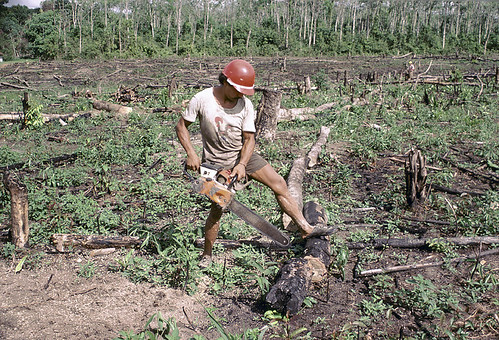Dealing with multiple objectives' poverty reduction and climate challenges in Finnish development co-operation
Prof. Mikael Hilden, Director for the Climate Change Programme at the Finnish Environment Institute (SYKE), outlines the findings and recommendations of a recent study exploring how poverty reduction and climate change responses could, and are in some cases, being integrated in the activities of development cooperation organizations such as the Global Environment Facility (GEF), the Special Climate Change Fund (SCCF) and the Least Developed Countries Fund (LDCF), and Clean Development Mechanism (CDM) activities.
In 2010, the Ministry for Foreign Affairs of Finland (MFA) issued a research call on how climate finance could be better used in development policy and development cooperation to reduce poverty; how sustainable poverty reduction could be promoted taking climate change into account; and how poverty reduction goals could be integrated into Carbon Procurement. Although the focus was on Finnish policy implementation, clearly other donors face similar challenges.
I led a consortium of the Finnish Environment Institute (SYKE), and the Asian Institute of Technology (AIT) assigned to carry out a study that began in February 2011. We based our research approach on the concept of policy learning. "Policy learning" has been defined as a structured, conscious change in thinking about a specific policy issue. This is assumed to encourage change in practice, and later when reflected upon, again to further change in thinking and policy. It requires an active effort on the part of the organizations involved. We chose this approach because we felt that it could provide insights into the difficulties encountered in implementing all the grand visions plentiful in policy documents. The emphasis on learning came naturally as everybody is aware of the rapidly changing operating environment. Rapid learning is essential for any organization that wishes to integrate poverty reduction and climate change responses effectively.
Our study explored:
- how poverty reduction and climate change responses could be integrated in the implementation of climate-relevant development cooperation and Clean Development Mechanism (CDM) activities,
- how the responsible organizations have learned to do this, and
- how such learning could be further enhanced. The study focused on Finland's bilateral and regional development cooperation, multilateral climate financing though the Global Environment Facility (GEF) Trust Fund, the Special Climate Change Fund (SCCF) and the Least Developed Countries Fund (LDCF), and the CDM activities. Geographically we focused mainly on the Mekong Region and Nepal.
Our approach involved systematically analyzing documents of the responsible organizations including key policy documents of the focus countries and information provided by key informants in the focus countries. We also explored relevant policies, strategies, management guidelines and strategic monitoring and evaluation reports but excluded documents of individual development cooperation projects.
The tricky part of such a study is to convincingly demonstrate the existence, or lack of, organizational learning. We solved this problem by developing a systematic framework for the analysis. This allowed us to explicitly look for signs of learning processes and results in the organization and its human resources, in strategies, in management guidelines and tools, in processes for monitoring and evaluation (M&E); and in the actual performance of activities. The ultimate test of policy learning is obviously in a genuine integration of poverty reduction and climate change responses that shows up in the actual performance of the activities. Overall we found that there were promising examples in all of the studied instruments but also challenges to be addressed.
Not surprisingly, we found the quality of project management, and  the degree of integration of poverty reduction and climate change responses, varied. We concluded that further emphasis on community-based development and equitable sharing of benefits could strengthen learning. Of the examined sectors, the forestry sector and meteorological cooperation are particularly likely to benefit from a stronger emphasis on community benefits. In the water sector, the implementation of integrated water resources and catchment management principles for climate change adaptation is an area where further learning is needed. In agricultural cooperation, the strategic principles of climate-smart agriculture should be operationalized more effectively. To strengthen the long-term sustainability and learning more effort is generally needed for enhancing knowledge-sharing and market transformation.
the degree of integration of poverty reduction and climate change responses, varied. We concluded that further emphasis on community-based development and equitable sharing of benefits could strengthen learning. Of the examined sectors, the forestry sector and meteorological cooperation are particularly likely to benefit from a stronger emphasis on community benefits. In the water sector, the implementation of integrated water resources and catchment management principles for climate change adaptation is an area where further learning is needed. In agricultural cooperation, the strategic principles of climate-smart agriculture should be operationalized more effectively. To strengthen the long-term sustainability and learning more effort is generally needed for enhancing knowledge-sharing and market transformation.
We found rather limited consideration of poverty issues in the documentation of the GEF, SCCF and LDCF although progress can be documented. The SCCF and the LDCF are inherently more directly relevant to poverty reduction as they focus on climate change adaptation in pro-poor sectors. However, the assessment and documentation of poverty impacts of the interventions, and the relevance of the interventions to national poverty reduction and climate policies and strategies need more attention. CDM projects in particular can have impacts on poverty reduction, but without detailed and careful analysis, claims concerning effects on poverty cannot be substantiated. In new CDM activities, priority should thus be given to CDM projects with high poverty reduction co-benefits. Projects should be validated and verified in accordance with standards including poverty reduction criteria.
We were also asked to provide recommendations on how to enhance policy integration and organizational learning. One part of the recommendations stressed a technical side of the learning process. We found, for example, that there is much more effort put on ex-post evaluations than ex-ante appraisals of climate and poverty oriented programmes and policies. Yet, effective learning requires good points of reference. These can be achieved by good ex-ante appraisals. Of the specific instruments that we examined, the CDM turned out to be clearly under developed when it comes to considering wider development objectives and especially poverty reduction. Correcting this may require changes in the very rules governing CDMs, but progress can also be made in developing the ways CDMs are handled and approved at the national level.
An important part of the recommendations dealt with the processes for managing the activities. There are still many unused opportunities for increasing participatory processes, for strengthening in-house capacity building and for creating opportunities for dialogues on the links between poverty reduction and climate change with beneficiaries. We also stressed the importance of the organizational memory, which in many cases has suffered from too rapid rotation of posts. Finally we noted that the dynamic state of affairs calls for bold piloting, coupled with appropriate monitoring and evaluation. Adaptive experimentation to address both poverty and climate issues should be encouraged, even if it involves some risk taking. Climate challenges call for novel approaches that haven been discovered yet.



